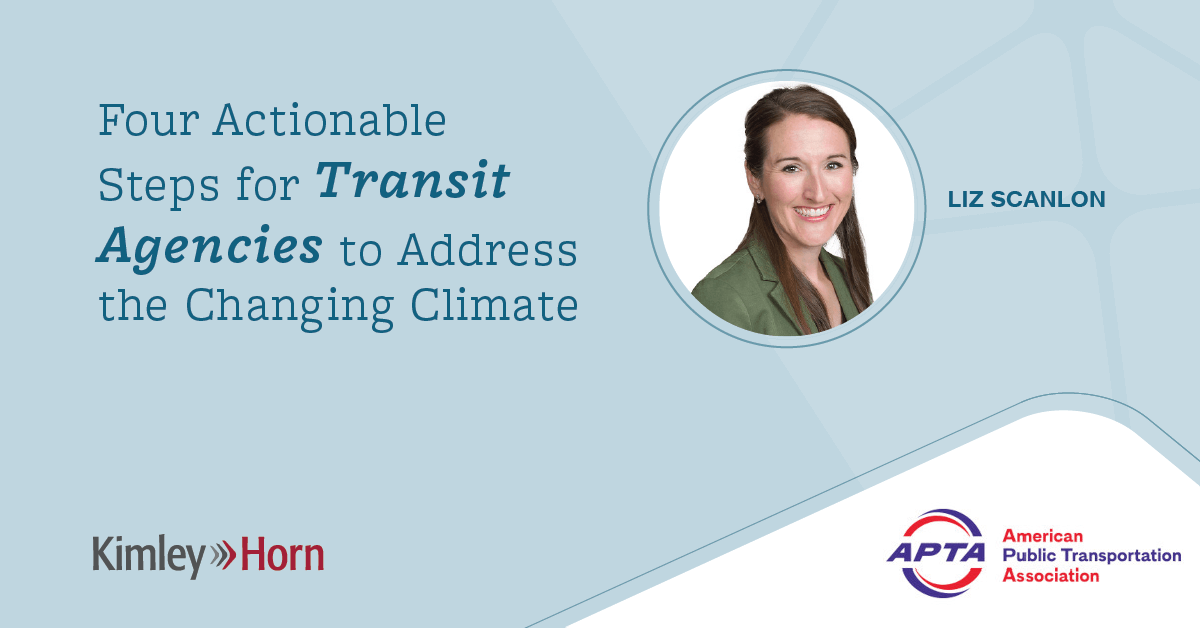- May 10, 2023
- Perspectives
Four Actionable Steps for Transit Agencies to Address the Changing Climate
Transit practice leader Liz Scanlon graduated from the 2022 Leadership APTA program and provided takeaways from her team’s capstone project

The American Public Transportation Association (APTA) is dedicated to enhancing mobility by disseminating information about new trends and transit priorities to the industry’s leaders and emerging professionals. The Leadership APTA program promotes career development for public transportation leaders, helping current experts take their skills to the next level and become thought leaders who bring actionable ideas to their roles and communities.
Liz Scanlon, an accomplished transit practice leader at Kimley-Horn, is a 2022 Leadership APTA graduate, and her team put together a capstone project to encourage transit agencies to boldly pursue actions to address the changing climate. Liz and her other accomplished teammates created a framework of four steps to prompt critical examination, research and data-informed planning, and audience awareness in sustainability planning.
Step 1: Self-reflection. Transit agencies should thoroughly assess their goals to align them with geographic mandates and regulations, considering how to incorporate sustainability into agency mission statements. This self-reflection should result in action that produces measurable results and fulfills the transit agency’s responsibility to provide the community with mobility options that integrate both public needs and sustainability considerations.
Step 2: Audience awareness. To create movement behind sustainability goals, agencies must support internal partners as they create environmentally responsible proposals and promote zero-emission transit solutions. Driving change from executive leadership can massively influence initiative effectiveness and help align programs for maximum impact. For external stakeholders, creative communication and branding can go a long way in educating the public on transportation options and empowering community advocates to support sustainable mobility.
Step 3: Case study research. Agencies can use case studies of successful sustainable transit initiatives to harvest data about effectiveness and use precedents to lay the foundation for new work. Several case studies were identified in the capstone, including the Sunline Transit Agency in California and the Champaign-Urbana Mass Transit District in Illinois. While the geographies and circumstances of all the case studies were different, they shared five key similarities: they each developed a sustainability plan, focused on multi-modal transportation, leveraged data and research, maximized internal resources, and coordinated with local municipalities and other stakeholders to bring the plan to fruition.
Step 4: Take action. Through environmentally responsible planning and collaboration, transportation agencies can progress community engagement efforts, add transit services, and integrate walking and biking options into transportation networks. While some key places to start acting are policies and company-wide initiatives, Liz’s team also suggests that agencies prioritize equitable workforce development and communication strategies.
If you are an APTA member, you can check out Liz’s comprehensive Leadership APTA report and presentation here.
About the Expert

Liz Scanlon
Liz has more than two decades of transit planning, strategic policy development, and capital program development experience with multiple different transit agencies. The former Director of Planning for Caltrain, Liz previously oversaw the strategic and long-range planning for the 51-mile commuter railroad corridor connecting San Jose to San Francisco, directing planning efforts and leading Caltrain’s coordination with the California High Speed Rail Authority. Now a Kimley-Horn transit practice leader, Liz has honed her skills in stakeholder engagement, station and transit facilities planning and design, environmental compliance, and rail transit long-range service visioning.
